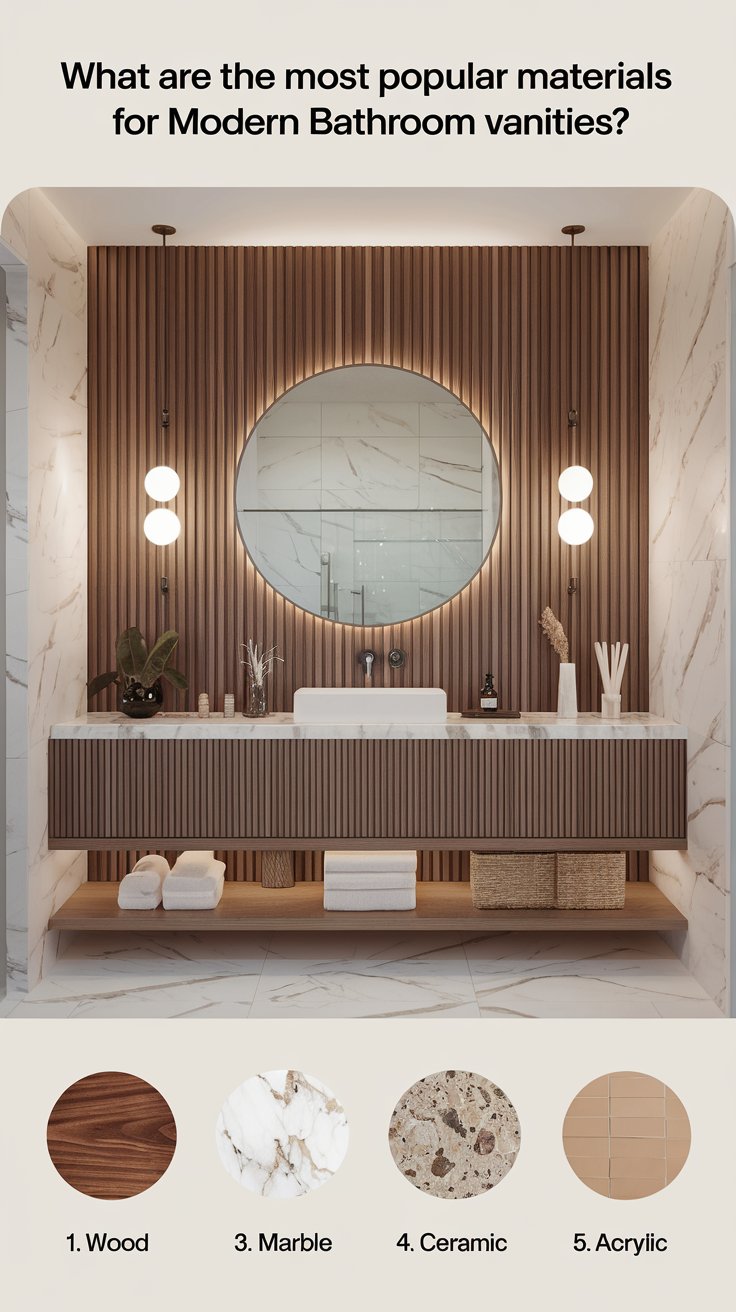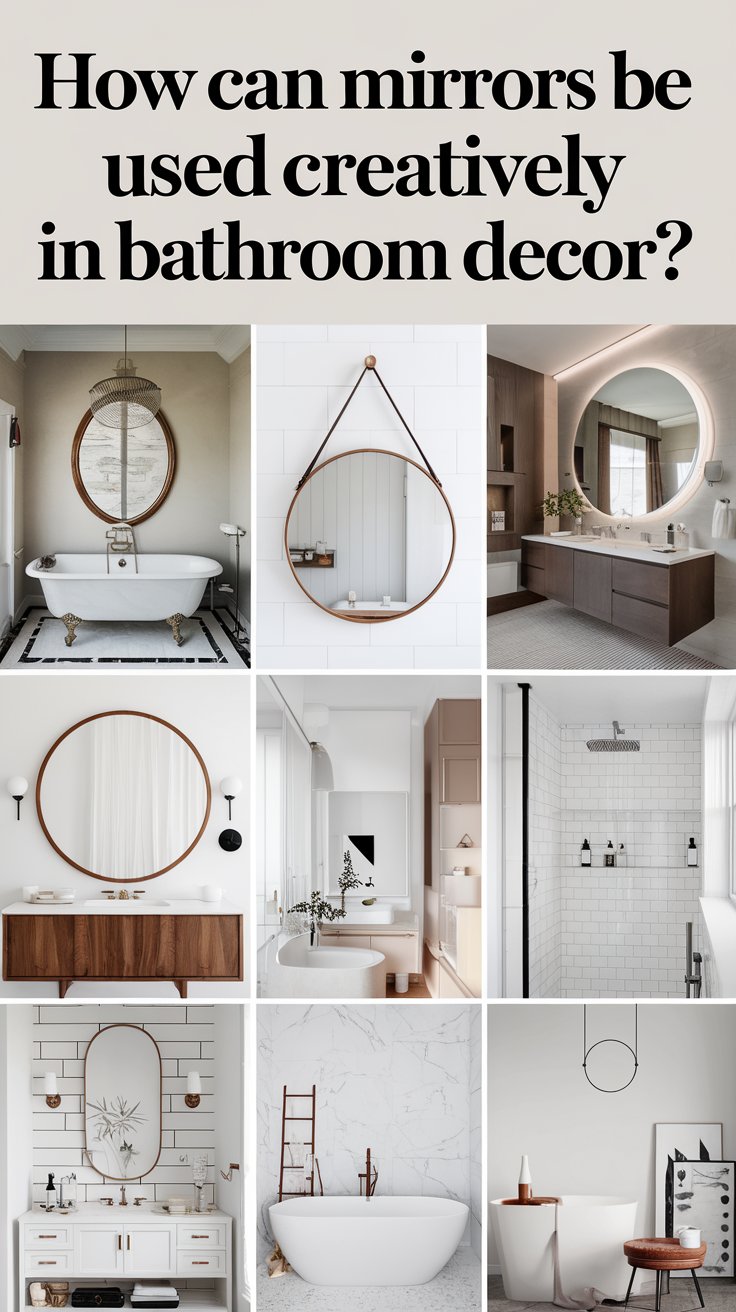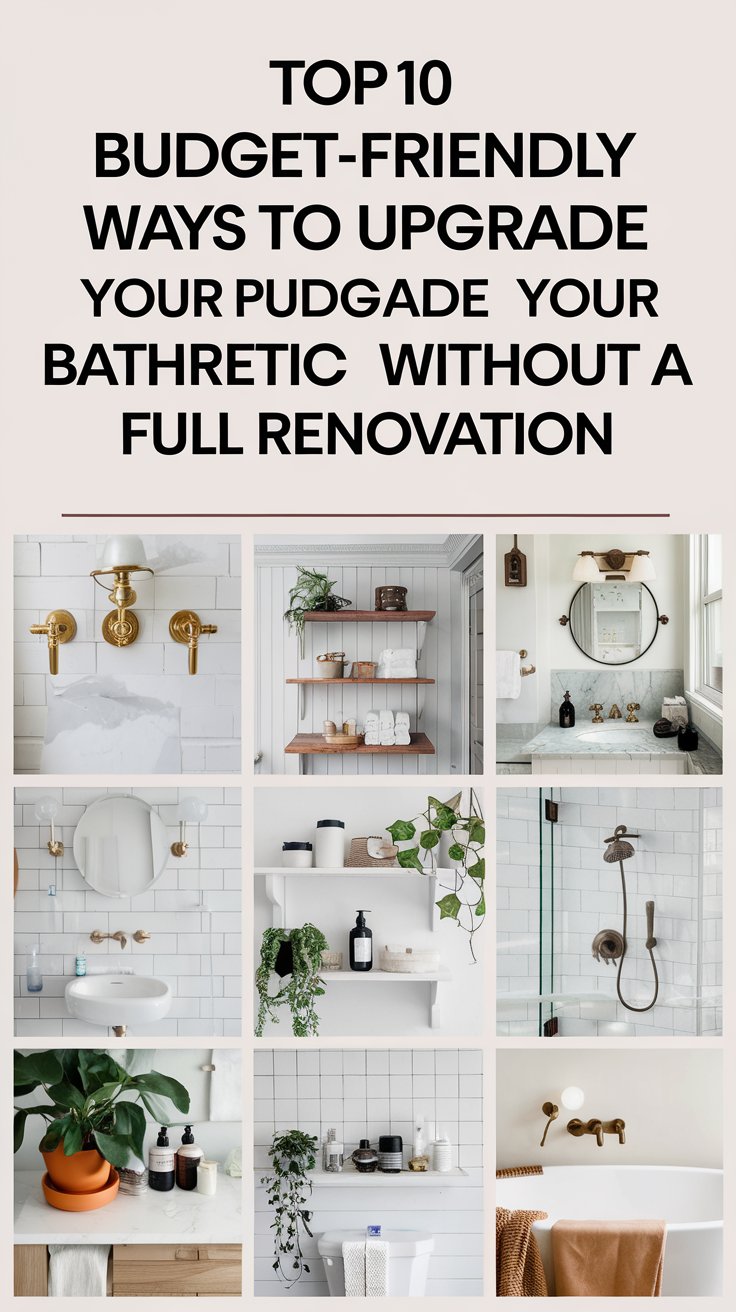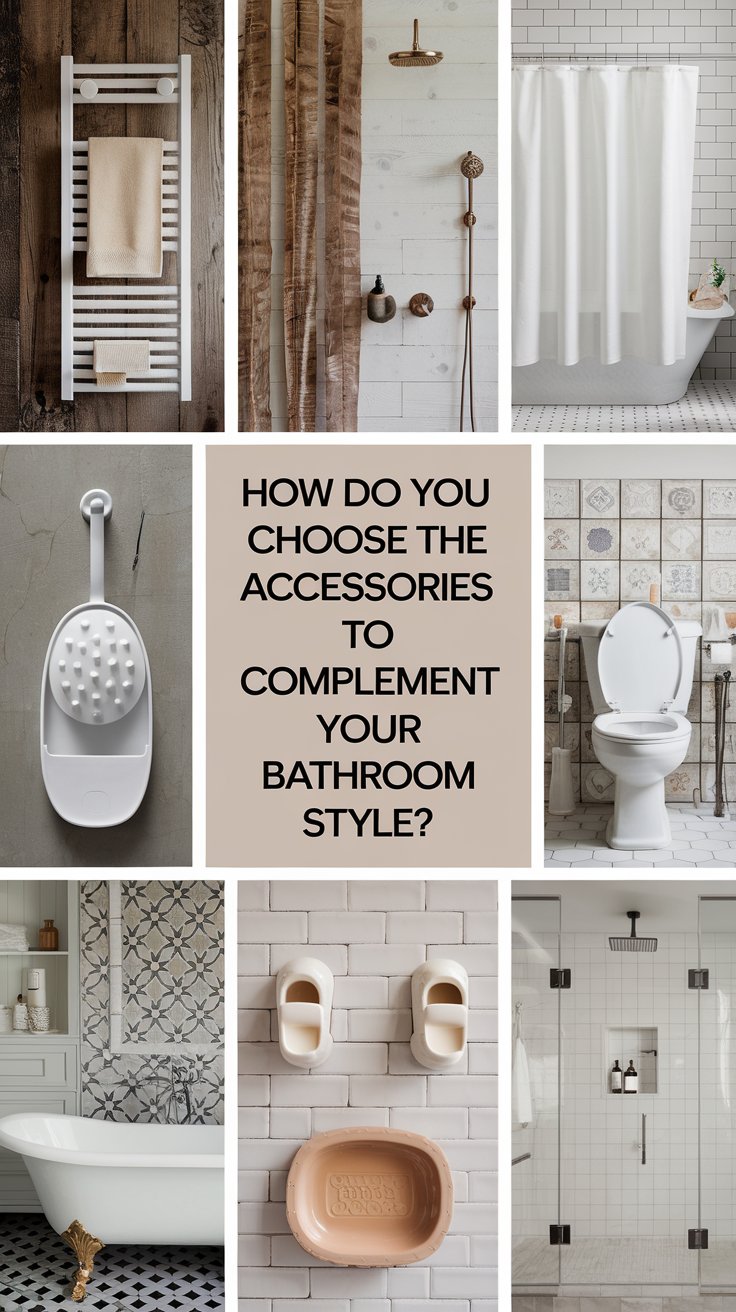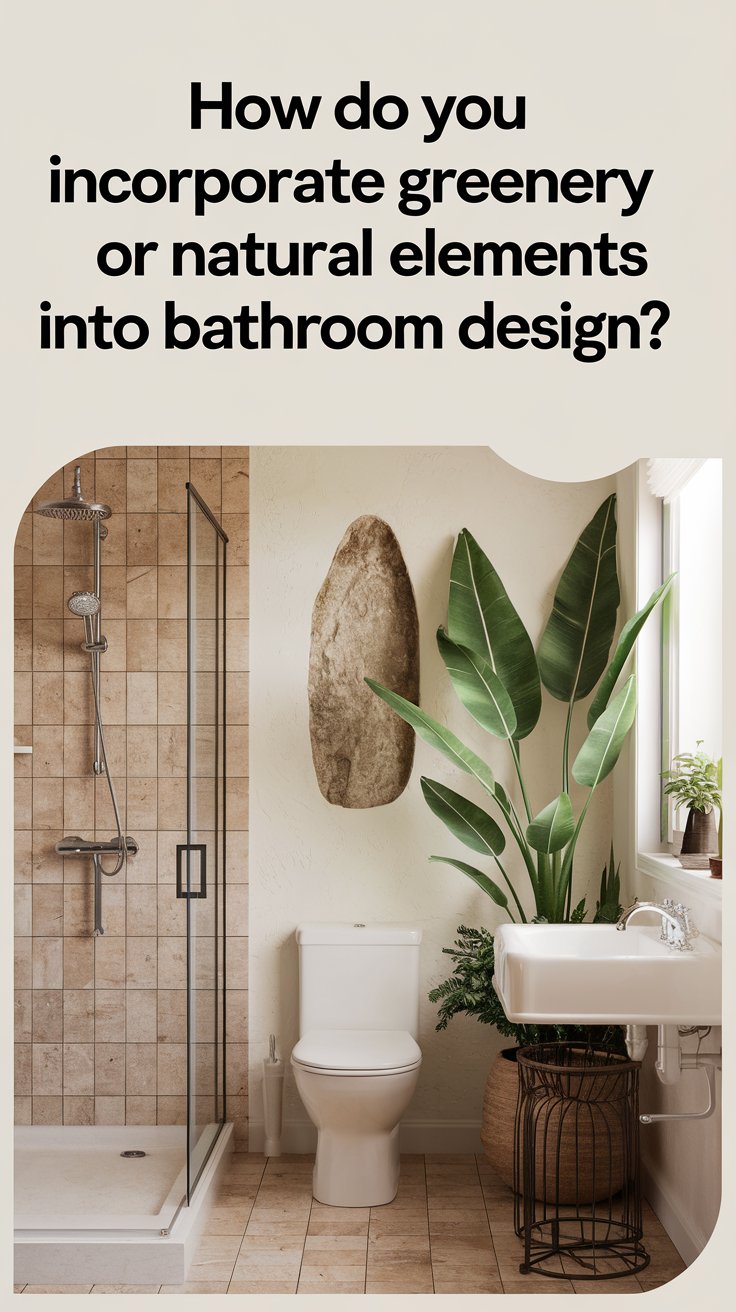Bathroom vanities are a key feature in any bathroom, combining style, functionality, and storage. The choice of material for a vanity can significantly influence the overall aesthetic and durability of the bathroom. In modern designs, materials range from natural to engineered, each offering distinct advantages. This article explores the most popular materials for modern bathroom vanities, helping you make an informed decision for your space.
1. Solid Wood

Solid wood is a timeless choice for bathroom vanities, prized for its natural beauty and durability. It is commonly made from hardwoods like oak, maple, or cherry.
Advantages:
- Aesthetic Appeal: Solid wood brings warmth and elegance to modern bathrooms, enhancing a cozy yet sophisticated atmosphere.
- Durability: Properly treated solid wood withstands moisture and wear, making it long-lasting.
- Customizable: Can be stained or painted in various finishes to suit different styles.
Considerations:
- Requires sealing to prevent water damage.
- Susceptible to warping in high humidity if not adequately protected.
2. Engineered Wood
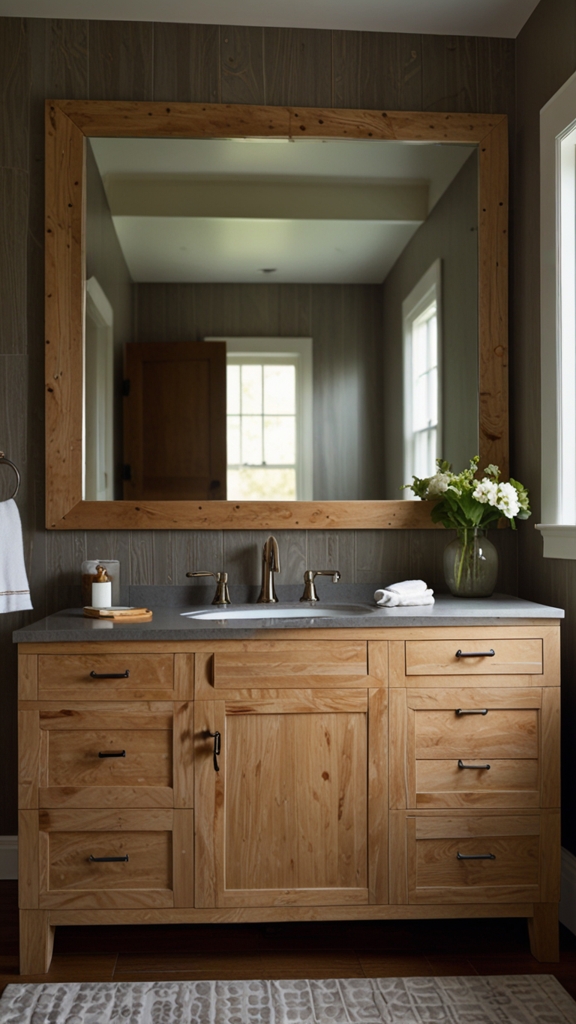
Engineered wood, such as Medium-Density Fiberboard (MDF) or Plywood, offers a budget-friendly alternative to solid wood while maintaining a similar look.
Advantages:
- Cost-Effective: Less expensive than solid wood but still provides a polished appearance.
- Resistant to Warping: More stable than solid wood in humid conditions.
- Versatility: Available in a wide range of finishes, including veneers and laminates.
Considerations:
- Less durable than solid wood.
- Requires proper sealing to avoid swelling from moisture exposure.
3. Laminate

Laminate vanities consist of a core material (like MDF) covered with a decorative plastic layer. This material is a modern favorite for its affordability and style.
Advantages:
- Wide Design Options: Available in countless colors, patterns, and textures, including wood and stone looks.
- Easy Maintenance: Resistant to scratches and stains, requiring minimal upkeep.
- Budget-Friendly: An affordable option that mimics the look of pricier materials.
Considerations:
- Edges can chip or peel over time.
- Less resistant to heat and impact than natural materials.
4. Veneer

Veneer vanities are crafted with a thin layer of real wood applied over an engineered wood base, offering the beauty of wood at a lower cost.
Advantages:
- Aesthetic Appeal: Maintains the luxurious appearance of natural wood.
- Eco-Friendly: Uses less wood than solid options, conserving resources.
- Cost-Effective: Provides a high-end look without the premium price.
Considerations:
- Vulnerable to moisture if the veneer layer is damaged.
- Can require regular care to maintain its finish.
5. Natural Stone

Natural stone, such as marble, granite, or quartzite, elevates the luxury factor of modern bathroom vanities. Typically used for countertops, stone can also form the entire vanity structure.
Advantages:
- Elegance: Adds sophistication with unique veining and patterns.
- Durability: Highly resistant to scratches and heat.
- Timeless Appeal: Maintains its beauty over decades.
Considerations:
- Expensive compared to other materials.
- Requires regular sealing to prevent staining, particularly with porous stones like marble.
6. Quartz

Quartz, an engineered stone, is a blend of natural quartz crystals and resins. It has gained immense popularity for bathroom vanities due to its durability and sleek appearance.
Advantages:
- Non-Porous Surface: Resists staining, making it low-maintenance and hygienic.
- Versatility: Available in a wide range of colors and patterns.
- Durability: Stronger and more resistant to cracking than natural stone.
Considerations:
- Can be pricier than some alternatives.
- Heavy, requiring sturdy support structures.
7. Acrylic
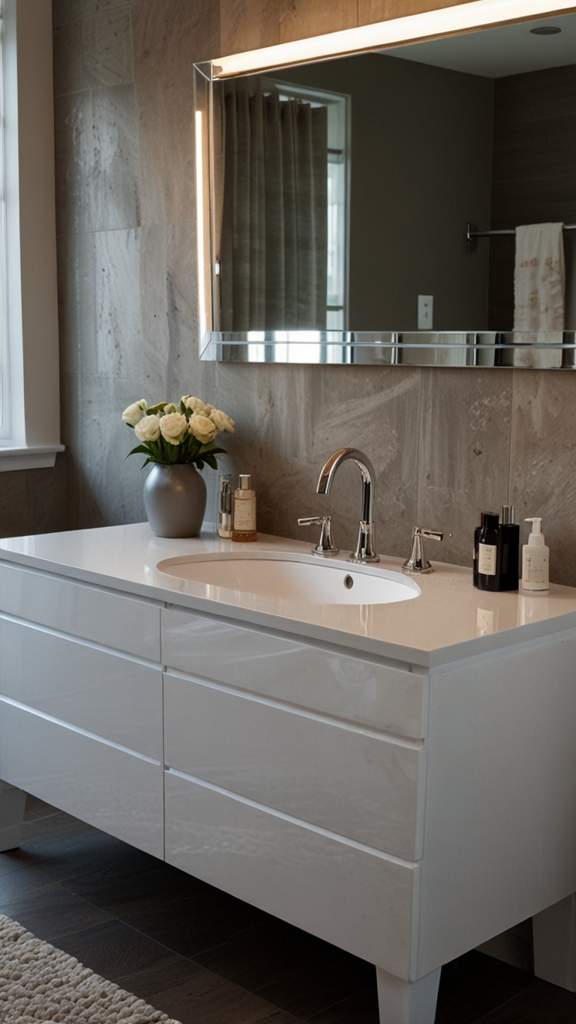
Acrylic is a lightweight, glossy material often used for contemporary vanity designs.
Advantages:
- Modern Look: Its sleek, shiny finish is perfect for minimalist bathrooms.
- Resistant to Moisture: Acrylic is non-porous and does not warp or swell.
- Easy Maintenance: Simple to clean and maintain over time.
Considerations:
- Prone to scratching if not handled carefully.
- Limited in terms of texture and patterns compared to other materials.
8. Metal
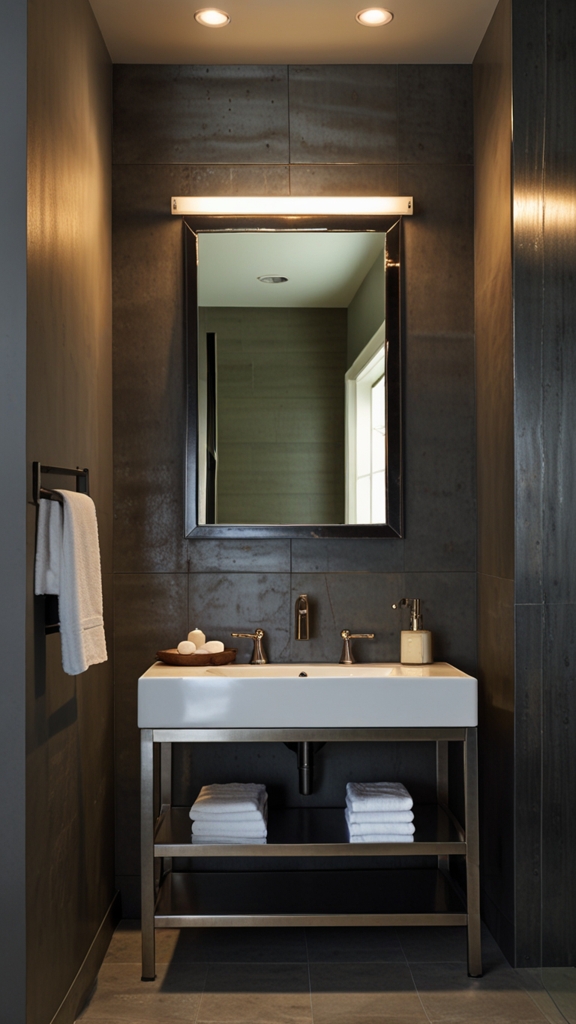
Metal vanities, including stainless steel and aluminum, are increasingly popular in modern and industrial-style bathrooms.
Advantages:
- Durability: Resistant to corrosion, moisture, and impact.
- Industrial Aesthetic: Offers a sleek and edgy look.
- Low Maintenance: Easy to clean and maintain.
Considerations:
- Can feel cold and impersonal if not balanced with other design elements.
- Susceptible to fingerprints and smudges.
9. Glass

Glass vanities bring a unique, contemporary appeal, often used in smaller bathrooms for their space-enhancing qualities.
Advantages:
- Visual Lightness: Makes the space feel open and airy.
- Modern Look: Ideal for sleek, minimalist designs.
- Easy to Clean: Resistant to stains and watermarks when properly treated.
Considerations:
- Prone to scratching and breaking under heavy impact.
- Requires frequent cleaning to maintain a spotless appearance.
10. Concrete

Concrete is a bold choice for modern bathroom vanities, popular in industrial and minimalist designs.
Advantages:
- Durability: Exceptionally sturdy and long-lasting.
- Customizable: Can be molded into various shapes and sizes, with options for pigmentation and texture.
- Unique Aesthetic: Offers a raw, contemporary look.
Considerations:
- Heavy, requiring professional installation and sturdy support.
- Prone to staining if not sealed correctly.
11. Recycled Materials

Eco-conscious homeowners often opt for vanities made from recycled glass, metal, or wood, blending sustainability with modern design.
Advantages:
- Eco-Friendly: Reduces environmental impact by repurposing materials.
- Unique Designs: Often features creative and artistic combinations.
- Durable: High-quality recycled materials can rival traditional options in strength and longevity.
Considerations:
- May be more expensive due to specialized manufacturing processes.
- Limited availability depending on location.
Choosing the Right Material for Your Bathroom Vanity
When selecting a material, consider the following factors to ensure the vanity suits your needs and style:
- Bathroom Size and Layout: Materials like glass and acrylic work well in small spaces, while wood or stone shine in larger areas.
- Budget: Engineered wood and laminate are budget-friendly, while solid wood and natural stone are premium options.
- Maintenance Requirements: Choose low-maintenance materials like quartz or acrylic for a hassle-free experience.
- Design Aesthetic: Match the vanity material to your bathroom’s overall style, whether modern, industrial, or minimalist.
- Durability: Opt for materials resistant to water and wear, especially in high-traffic bathrooms.
Final Thoughts
Modern bathroom vanities offer diverse material options, each with unique benefits. Whether you prefer the timeless charm of solid wood, the elegance of natural stone, or the contemporary appeal of glass and metal, there’s a perfect material for every bathroom style and budget. Prioritize durability, maintenance, and aesthetics to create a functional and visually appealing space that stands the test of time.

